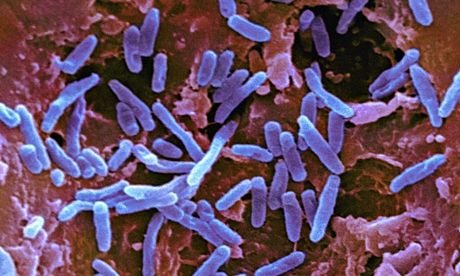Cancer scientists seek to stop radiotherapy's side-effects on 'friendly' gut bacteria
Researchers hope to develop techniques to save vital microbes from being disrupted by radiation treatment
Robin McKie
The Observer
Sunday 23 March 2014
Just some of the bacteria we have in our guts Photograph: Science Photo Library/ Centers for Disease Control an
Researchers have launched a pioneering study aimed at finding ways to type individuals according to the bacteria in their guts. The aim is to discover if some people's microbial makeup makes them more susceptible to the side-effects of radiotherapy for bowel, prostate and other cancers.
"If we can do that – if we can pinpoint those whose gut bacteria makes them more at risk of side-effects than others – then we might be able to think of ways of intervening with various treatments that will boost their gut bacteria's ability to withstand radiotherapy," said one of the project's leaders, Professor David Dearnaley, of the
Institute of Cancer Research in London. "In the long term we could develop a range of new treatments for many different conditions."
The study of the human microbiome – the population of microbes that share our bodies – has become an important topic of research in recent years. Doctors have discovered that the state of a person's gut bacteria can have profound implications on health.
"Men and women have a startling amount of bacteria in their stomachs and intestines," said Dearnaley. "There is 1.4kg of bacteria in the average human gut. That is roughly the same weight as the human brain. Indeed, you can think of your microbiome as an extra organ inside your body and its behaviour can have distinct consequences."
In fact, the microbes in our bodies represent a significant mass of foreign matter. There are 10 times more bacteria than human cells in our bodies, microbes that are made up of between 500 to 1,000 different species, say scientists.
These tiny entities play a key role in maintaining health. They boost the activity of immune systems and make it easier for an individual to tackle invading organisms.
Gut bacteria also play a key role in breaking down food as it passes through our intestines. Both the bacteria and their human hosts gain from this relationship, a process known as symbiosis: microbes get housing and food inside our gut; we get help digesting food and a boost to our immune systems. "It is wrong to think of bacteria as invariably being harmful," said another scientist involved in the study, Dr Jose Ferreira, who is also based at the institute. "There are a great many species of bacteria that are very good for us."
Read More:
http://www.theguardian.com/science/2014/mar/23/gut-bacteria-cancer-radiotherapy

